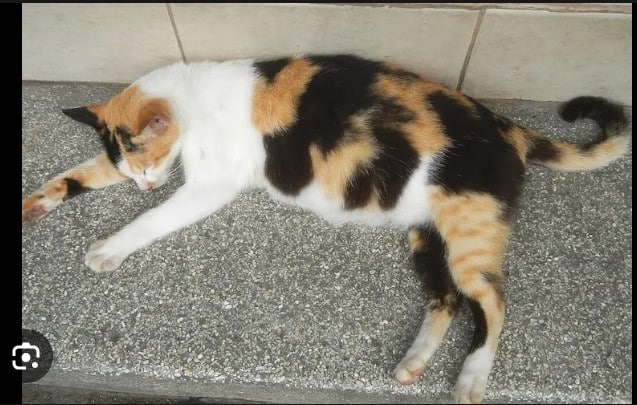Have your cat been acting a certain kind of way and gaining weight? There is a huge possibility that your cat is pregnant, especially if she has been around male cats lately. However, it can simply be a speculation unless you find out for sure. That is why in this post, we will discuss, “How to Know When a Cat is Pregnant: Symptoms Of Early Pregnancy in Cats”. We also made mention of Behavioral Changes and Physical Signs to look out for. As well as how to get a Veterinary Confirmation.
Welcoming kittens into your home is a joyful and emotional experience for both you and your cat. Before the tiny bundles of fur arrive, it’s crucial to understand how to recognize if your cat is pregnant. As well as what you can do to make her pregnancy a happy one. Keep in mind that having kittens comes with responsibilities. Thus, being prepared to meet the needs of your cat and her litter is essential. To assist you in supporting your pet during pregnancy and labor, we’ve compiled everything you need to know about expectant cats.
See also: Grey and White Cat Breeds
Is my Cat really Pregnant?
If your cat recently showed signs of being in heat and spent time with a male cat that hasn’t been neutered, there’s a high possibility she might be pregnant. Unlike humans, cats can go into heat and become capable of having kittens as early as four months old. Also, unlike humans, cats don’t go through menopause. Thus, meaning they can keep having kittens throughout their entire lives. If you’re not planning to breed your cat, it’s a good idea to get her spayed early on to prevent unintentional pregnancies.

Symptoms of Early Pregnancy in Cats
A pregnant cat, also called a queen if she hasn’t been spayed, will start showing noticeable changes in her body and behavior about three weeks after mating. These changes include swollen nipples, a growing belly, and behaviors like nesting. Some clear signs of pregnancy include:
See also: 15 Cat Behaviors you didn’t know about
Behavioral Changes
These changes in behavior and mood also show that the cat might be pregnant:
Increased Affection
One of the earliest signs that your cat may be pregnant is a sudden increase in affection. If your usually independent feline friend starts seeking more attention, becoming unusually cuddly, and wanting to be close to you, it could be a sign of impending motherhood.
Changes in Appetite
Pregnancy can have a significant impact on a cat’s appetite. Some pregnant cats may show an increased interest in food, while others may experience a decrease in appetite. Pay attention to any noticeable changes in eating habits, as they can provide valuable insights into your cat’s reproductive status.
See also: 10 Healthiest Cat Treats of 2024
Nesting Behavior
As pregnancy progresses, many pregnant cats exhibit nesting behavior. This involves searching for a quiet and comfortable place to give birth. If you notice your cat trying to create a cozy space, rearranging bedding or seeking out secluded areas, it’s a clear indication that she is preparing for the arrival of her kittens.

Physical Signs
Watch out for these signs in your cat’s body that suggest she might be pregnant. These signs can also help you figure out how long she has been pregnant;
Enlarged Nipples
Around three weeks into pregnancy, a cat’s nipples may undergo noticeable changes. They may become enlarged and take on a pinkish hue. These physical alterations signal the body’s preparation for nursing, as the mammary glands begin to develop in anticipation of feeding the upcoming litter.
See also: 10 Most Clever Cat Breeds
Weight Gain
A gradual increase in body weight is a common physical sign of feline pregnancy. While it’s essential to avoid overfeeding, providing a well-balanced and nutritious diet tailored for pregnant cats is crucial to support the health of both the mother and her developing kittens.

Swollen Abdomen
In the later stages of pregnancy, a pregnant cat’s abdomen will become visibly swollen. Gently palpating the area may allow you to feel the growing kittens. However, it’s important to exercise caution and consult your veterinarian for guidance to ensure a safe examination.
Changes in Appearance
Your cat’s appearance may change when pregnant. Watch out for the following;
Changes in Fur Condition
Pregnancy can influence a cat’s coat condition. Some cats develop a shinier and thicker coat due to hormonal changes, while others may experience hair loss. Regular grooming and a balanced diet can help maintain your cat’s coat health, but any concerns should be discussed with your veterinarian.
See also: 10 Beautiful Black Cat Breeds you can Adopt
Pink Vaginal Discharge
A subtle but crucial sign of feline pregnancy is the appearance of a pinkish discharge from the cat’s vagina, known as “show.” This discharge occurs when the mucus plug dislodges from the cervix in preparation for labor. Monitoring your cat’s hygiene and promptly consulting your vet if you notice any abnormalities are essential steps in ensuring a healthy pregnancy. Keep reading for more information on “How to Know When a Cat is Pregnant: Symptoms Of Early Pregnancy in Cats”.
Veterinary Confirmation
If all other fails, you can simply visit a vet to find out for sure through;
Ultrasound
For a definitive confirmation of pregnancy, consult your veterinarian for an ultrasound. This non-invasive imaging technique allows your vet to visualize the developing kittens, determine their number, and assess their health. Ultrasound is a valuable tool for gaining insights into the progression of the pregnancy.
See also: Best Interactive Toys for your Cat

Hormone Testing
Blood tests measuring hormone levels, particularly relaxing, can provide another method of confirming pregnancy in cats. Discuss this option with your vet to determine the most suitable diagnostic approach for your furry companion.
How to Care for a Pregnant Cat
Once your vet confirms that your cat is pregnant, they will give you specific advice on how to take care of her during pregnancy. Generally, to ensure your cat has a healthy and safe pregnancy and birth, it is recommended to:
- Avoid squeezing or pressing on her belly.
- Provide plenty of high-quality food, as pregnant and nursing cats may eat up to 25% more than usual.
- Clean her litter box once or twice a day.
- Make sure the litter box is easily accessible as her belly gets bigger.
- Set up a cozy, clean area for her to give birth and care for her kittens. This space should be warm, quiet, and away from children, other people, and other pets.
See also: 10 Fruits you Can Give your Cat

How do Vets Diagnose Cat Pregnancy
If your female cat has been regularly seeing the vet and shows clear signs of being pregnant, you might not need an official diagnosis from the vet. However, it’s still a good idea to have your vet check your cat to ensure she’s healthy. Keep reading to know about How to Know When a Cat is Pregnant: Symptoms Of Early Pregnancy in Cats
During the check-up, your vet may do a:
Exam and Palpation
Feel your cat’s belly by gently pressing on it. This is typically done around the 17th to 25th day of pregnancy.
Ultrasound
Use ultrasound to see if there are fetuses. This can be done as early as the second week of pregnancy, and heartbeats may be detected after the third week.
See also: Are Snake Plants Toxic To Cats: See How Snake Plants Can Affect Cats
X-rays
Your vet can use X-rays (radiographs) to take pictures of your cat’s belly when she’s further along in her pregnancy. This helps determine how many kittens she’s carrying. The amount of radiation used in this process is small and won’t harm the kittens or the mom. Around 42 days into the pregnancy, you can see the spines and skulls of the kittens on the X-rays.

Pregnancy Test
There are also pregnancy tests for cats, similar to those for humans, that can detect certain hormones released during pregnancy. Although vets usually use the methods mentioned earlier, if there’s uncertainty and your vet can’t perform an ultrasound or X-ray, a blood sample can be taken for a pregnancy test. Unlike human tests, which use urine, cat pregnancy tests require a blood sample.
If your cat is confirmed pregnant, you’ll need to make some important decisions. However, if you choose to spay her and prevent the pregnancy, it’s best to do it early. If not, get ready to take care of the mom during her pregnancy, help with the kittens, and find them good homes.
See also: Top 10 Best Cat Beds for Purr-fect Comfort
Signs that your cat is about to Push
Once your cat starts giving birth, try not to disturb her. Keep a safe distance and watch to ensure she’s not in any trouble. The first stage of labor, when contractions start and the cervix opens, usually lasts about six to 12 hours. The second stage is when the kittens are born, and there can be 10 minutes to an hour between each one. After each kitten is born, the cat goes through the third stage of labor, delivering the placenta. It can take anywhere from two hours to more than a day for a cat to finish giving birth once the second stage begins, but it’s typically around two to six hours.
These signs show that kittens are about to be born:

Nesting Activities
Your pregnant cat may start looking for quiet and private places for giving birth. This usually begins up to two days before labor, but it might be just a few hours before.
Restlessness
Around 24 to 48 hours before labor, your pregnant cat might seem restless or anxious. She may go in and out of her nesting area, like she’s pacing.
See also: Are Lilies Toxic To Cats: Find Out If Lilies Affects Your Cat
Panting
It’s common for a female cat to pant as labor is about to start.
Vocalization
Along with pacing and restlessness, the pregnant cat may meow and cry more than usual. Keep reading this post on “How to Know When a Cat is Pregnant: Symptoms Of Early Pregnancy in Cats” to know more.
Lowered Body Temperature
About 12 to 36 hours before labor, your cat’s body temperature will go below 100 degrees Fahrenheit (usually it’s between 100.5 and 102.5 degrees Fahrenheit).
See also: A Comprehensive Guide To Raw Cat Food
Loss of Appetite
If your pregnant cat has been eating well during pregnancy, she’ll suddenly eat much less as labor gets closer.
Vulva Licking
As labor gets near, your cat will start licking her vulva to clean a light discharge. You might not see this discharge because she’ll try to keep the area clean.

Conclusion
In summary, being aware of the signs of early pregnancy in cats is crucial for their well-being. By recognizing behavioral and physical changes, seeking veterinary guidance, and preparing for the birthing process, responsible cat owners can ensure a healthy and happy experience for their feline friends. Whether it’s creating a comfortable space for nesting or considering spaying options, the journey of feline pregnancy is a shared adventure that culminates in the joy of welcoming new furry additions to the family.
See also: https://www.partridgepractices.co.uk/article/our-vet-shares-tell-tale-signs-of-cat-pregnancy/

